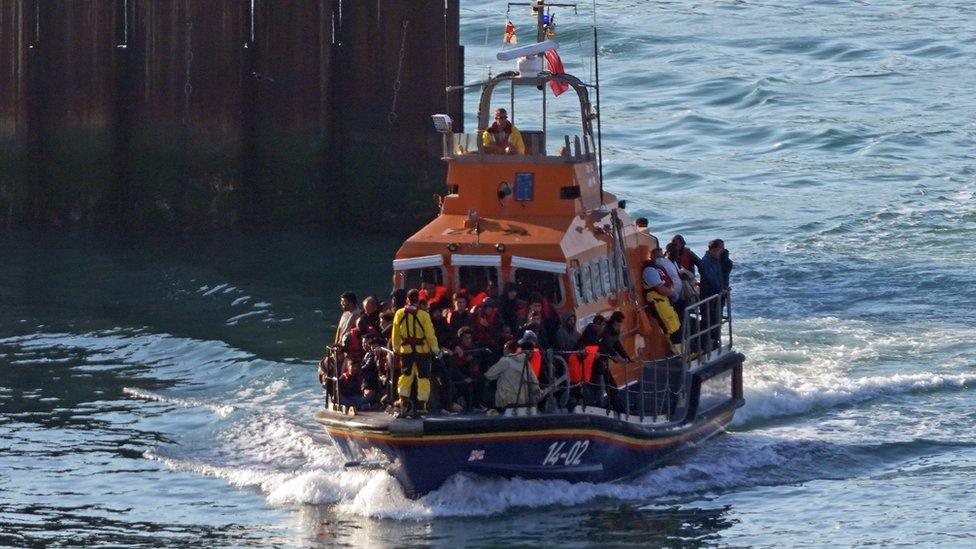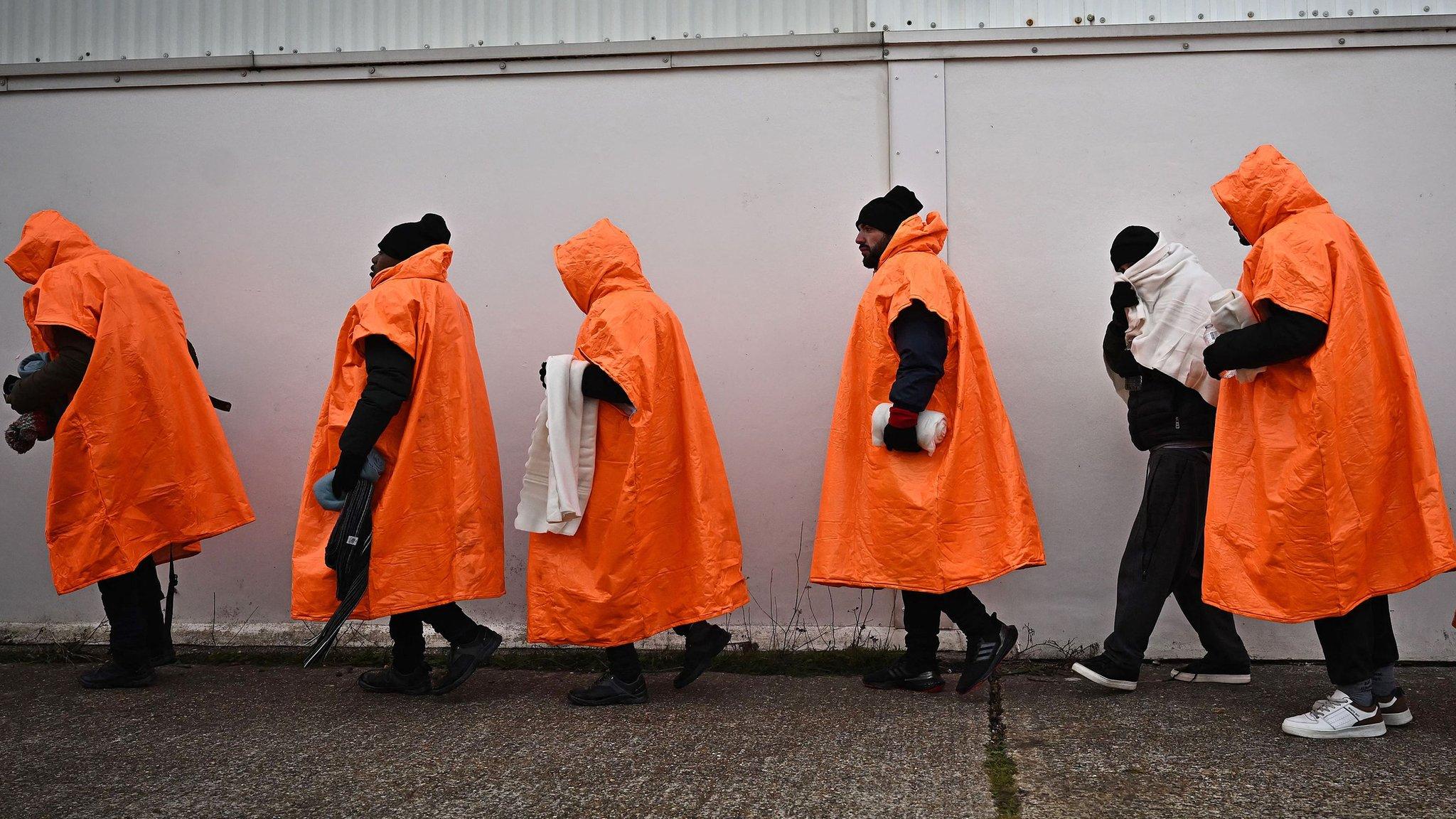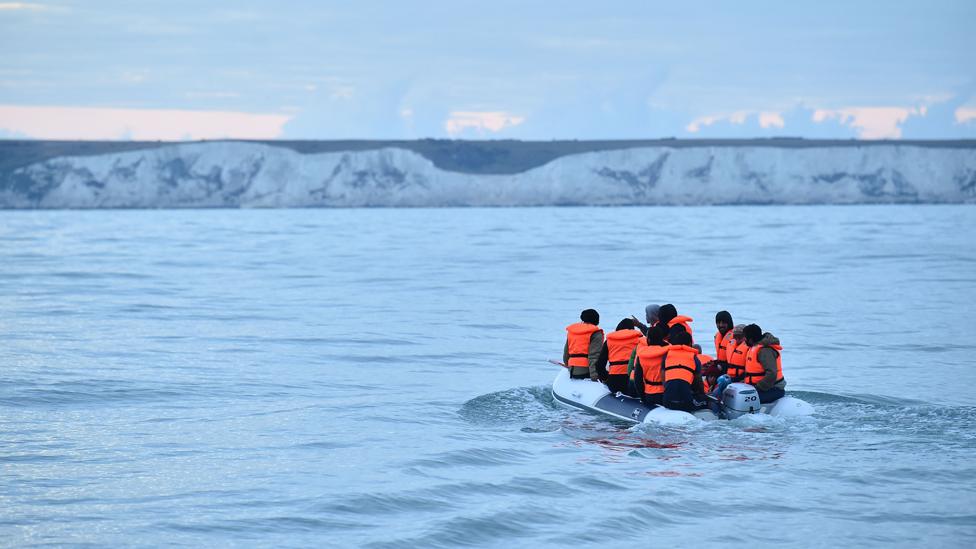Channel migrants: Crossings fell in 2023, government figures show
- Published

The provisional annual total for 2023 found 29,437 people crossed the Channel in small boats - down 36% on 2022
The number of migrants crossing the Channel has fallen year-on-year for the first time since current records began.
Government figures show the total arrivals in 2023 were down by more than a third on 2022.
The provisional annual total for the year, 29,437, is 36% lower than the record 45,774 crossings for the whole of 2022.
The last crossing of the year was on December 16, when 55 people made the journey from France in one boat.
In August last year, the number of migrants crossing the Channel in small boats since current records began in 2018 reached more than 100,000.
However, the Immigration Services Union (ISU), which represents border staff, said the decrease in small boat arrivals in 2023 was likely a "glitch", with "higher numbers" expected in 2024.
Lucy Moreton from the ISU told BBC Radio 4's Today programme: "The planning assumption for 2024 is that 2023 has been unusually low. There have been other confounding factors — we have had particularly high winds, we have had a larger number of days where it is less likely that we are going to get migrants in boats.
"But we have also had much larger boats, much more seaworthy boats, so the planning assumption is that this is a glitch.
"Border Force needs to continue to resource itself - and the country needs to continue to resource itself - to deal with higher numbers."
Illegal migration minister Michael Tomlinson said the government was "clamping down on criminal gangs" and working with France to prevent further crossings.
"Stopping the boats will continue to be our priority in the new year as we target people smugglers and break their business model," Mr Tomlinson said in a statement.
The figures for 2023 are still higher than those for 2021, which saw 28,526 people make the crossing.
Speaking on BBC Radio 4's World At One, former UKIP leader Nigel Farage criticised "boasts" that Home Secretary James Cleverly made that no migrants had crossed the Channel over the festive period for the first time since 2018.
"It's because we've had persistent gales and wind of up to 50mph, even cross-Channel ferries were delayed", Mr Farage said.
Referring to the fall in crossings, he said: "It is still a vast number and it is still out of control.
"There is no prospect of this stopping, and there won't be," he added.
Mr Farage said the crossings would continue until people arriving on the UK coast via illegal means were deported, and said the UK needed to stop acting as a "taxi service" for the French Navy.

Analysis
by Simon Jones, BBC News
Privately the Home Office had been preparing for up to 60,000 people to make the crossing last year. So there will be some relief among officials that the final figure turned out to be less than half that.
However, the debate continues about whether government policy has been the primary reason for the drop in figures - or whether it was largely down to the weather.
Certainly on very calm days, the numbers arriving have been in the high hundreds, whereas in previous years more more than 1,000 people could arrive in a single day.
But 2023 did see some long periods of very windy weather, particularly over the summer.
The sea has also been too choppy for any crossings since the middle of December - and the weather remains poor today.
Whatever the reasons for the downturn, small-boat crossings will remain a big political issue in the run-up to the general election.
Refugee groups are calling on all politicians to uphold the right to asylum and expand safe routes for people fleeing oppression.

The English Channel is one of the most dangerous and busiest shipping lanes in the world.
Many migrants come from some of the poorest and most chaotic parts of the world, and many ask to claim asylum once they are picked up by the UK authorities.
Prime Minister Rishi Sunak previously said "stopping the boats" was a key priority but last month said there was no "firm date" for meeting his pledge after facing questions from MPs.
The promise was one of the five priorities the Prime Minister set out at the start of 2023 when he said he would pass new laws to make sure people deemed to be arriving in the country illegally would be "detained and swiftly removed" as political pressure to grip the migrant crisis intensified.
Sacked home secretary Suella Braverman never got to see her "dream" of sending migrants to Rwanda succeed as the policy stalled amid legal action and was then ruled unlawful by the Supreme Court.
January will see fresh legislation back before Parliament in a bid to get flights off the ground after Mr Cleverly signed a treaty with the east African nation in a bid to firm up the agreement and satisfy concerns raised by the court.

Follow BBC South East on Facebook, external, on X, external, and on Instagram, external. Send your story ideas to southeasttoday@bbc.co.uk, external
Related topics
- Published13 December 2023

- Published11 August 2023

